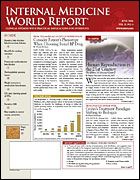Publication
Article
Internal Medicine World Report
Avoid Extended Treatment of HCV-1 in Most Patients
Author(s):
Gastroenterology
Evidence has already demonstrated that extending treatment from 24 to 48 weeks in patients with hepatitis C virus genotype 1 (HCV-1) infection markedly increases the sustained virologic response (SVR) rate. Results of a new study (. 2006; 130: 1086-1097) suggest that there is no added benefit to extending the duration of treatment to 72 weeks. Unlike patients with type 2 or 3 disease, in whom treatment is often successful, only about one half of those with type 1 disease achieve an SVR.
Investigators randomized 455 treatment-naïve patients with HCV-1 infection to either 48 or 72 weeks of treatment with pegylated-interferon-alfa-2a (180 µg/ week) plus ribavirin (800 mg/day).SVR was determined using quantitative polymerase chain reaction (PCR) assays, with SVR defined as an undetectable HCV-RNA serum level at 24 weeks after treatment discontinuation.
There were no significant variations in SVR between the 2 groups or among patients who showed an early response to treatment, with SVR rates ranging from 76% to 84% for both groups. The major difference was in slow virologic responders, with almost twice as many achieving an SVR with 72 weeks of treatment versus 48 weeks (29% vs 17%).
Although the type and severity of adverse effects did not differ significantly between the groups, 41% of patients in the 72-week treatment group stopped taking the medications early compared with only 24% of those in the 48-week group.
Lead investigator Thomas Berg, MD, of the Universitätsmedizin, Berlin, Germany, and colleagues noted that “the duration of antiviral therapy is one of the most important factors influencing treatment outcome, especially in HCV genotype 1–infected patients.” They concluded that 48 weeks should still be considered the optimal duration of therapy for most HCV-1–infected patients, but that PCR testing at weeks 4 and 12 could identify patients who do not have an early virologic response and could thus benefit from extending therapy to 72 weeks.
Writing in an accompanying editorial (pages 1357-1362), Robert J. Fontana, MD, of the University of Michigan Medical Center in Ann Arbor, observed that “explanations for a lack of improved SVR include the high rate of early termination in patients randomized to 72 weeks, many of whom self-discontinued after week 48.” He also questioned the ribavirin dosage, citing evidence showing that 1000 to 1200 mg/day is superior to the 800-mg/day dosage used in the study.
Dr Fontana said that “a limited subgroup of patients may benefit from extended therapy.” However, until confirmatory studies are available, problems with tolerability and uncertainty about efficacy argue against changing the currently recommended 48-week duration for treatment-naïve patients.






